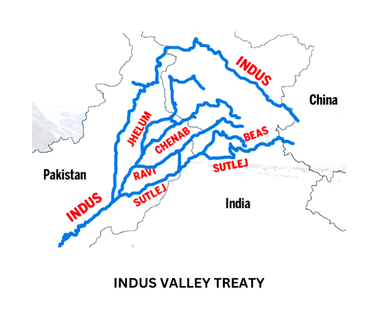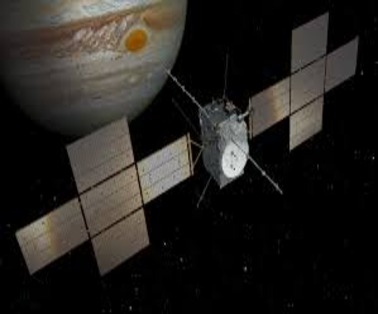The Permanent Court of Arbitration (PCA) in the Hague, the Netherlands, ruled that it is competent to decide the proceedings initiated by Pakistan against India over the Kishanganga and Ratle hydropower projects in Kashmir.
Pakistan-India Water Dispute
- Pakistan and India have locked horns several times over hydroelectric projects on the shared Indus River and its tributaries for decades.
- While Pakistan has sought an adjudication by a Court of Arbitration to resolve the matter, India favours a resolution by a highly-qualified engineer — called a neutral expert — under the treaty.
- The Court of Arbitration is chaired by Professor Sean D. Murphy of the US.
- The meetings of the court on the question of competence took place at the Peace Palace, the PCA headquarters
- However, India has refused to participate in or take recourse to the arbitration proceedings so far.
- India said it cannot be compelled to participate in “illegal” proceedings at the PCA.
- The award of the court is final and binding on the parties
What Is The Current Dispute About?
- The current proceedings before the PCA were initiated by Pakistan against India, under the Indus Waters Treaty 1960.
- Under this treaty, the waters of the eastern rivers — the Sutlej, Beas and Ravi — belong to India, while the three western rivers — the Indus, Jhelum and Chenab — go to Pakistan, barring certain non-consumptive uses.
- The treaty provides for settlement of all questions that may arise on its interpretation or application.
Process

India’s Stand On PCA Ruling
- The PCA court of arbitration was empanelled in October last year. However, India has chosen not to communicate directly with or to appear before the court, nor has it appointed two arbitrators to the court, as it is permitted to do under the treaty.
- Among other things, India has maintained a stance that this court of arbitration is not competent to decide the questions before it, and that the dispute should instead be decided by a neutral expert.
- India has also submitted that the treaty does not allow parallel proceedings before both, a court of arbitration and a neutral expert.
- India has also questioned the World Bank’s decision to appoint a court of arbitration and a neutral expert under two separate processes to resolve differences between the two countries.
Permanent Court of Arbitration
- It was established in 1899 and is headquartered in The Hague, Netherlands.
- It is an intergovernmental organization dedicated to serve the international community in the field of dispute resolution and to facilitate arbitration and other forms of dispute resolution between States.
- The objective is “to facilitate the arbitration of international disputes”.
Permanent Court of Arbitration Structure
- It has a three-part organizational structure consisting of:
- Administrative Council – to oversee its policies and budgets,
- Members of the Court – a panel of independent potential arbitrators, and
- International Bureau – its Secretariat, headed by the Secretary-General.
Permanent Court of Arbitration Features
- Arbitration has remained a rather infrequent means of resolving international disputes, though the UN Charter allows the states to settle their differences in tribunals other than the ICJ (International Court of Justice). The Court had a very limited role for several decades.
- It adopted a new set of optimal rules in 1992 for giving greater flexibility and greater use of its resources for arbitrating disputes between the states.
- In 1993, it adopted certain new rules for arbitrating disputes between a state and a non-party state.
- The PCA held its first Conference of Members in 1993 to discuss the future of the Court and established a Steering Committee.
- Under the new rule, the Court can arbitrate disputes both within and between inter-governmental organisations or between private corporations.
- It has a Financial Assistance Fund which aims at helping developing countries meet part of the costs involved in international arbitration or other means of dispute settlement offered by the PCA.
To Download Monthly Current Affairs PDF Click here
Get Inspiration from CLAT 2025 Topper
Click here to get a free demo
Everything About CLAT 2025
Frequently Asked Questions
What is the PCA ruling on the Pakistan-India dispute?
The Permanent Court of Arbitration (PCA) ruled that it has the competence to decide the ongoing dispute between Pakistan and India over the Kishanganga and Ratle hydropower projects in Kashmir.
What is the main issue in the Pakistan-India water dispute?
The dispute is centered around the Indus Waters Treaty of 1960, particularly India’s construction of hydropower projects on rivers that flow into Pakistan, such as the Kishanganga and Ratle projects.
Why is India refusing to participate in the PCA arbitration?
India refuses to participate in the PCA arbitration because it believes the process is illegal and that the dispute should be resolved by a neutral expert instead of a court of arbitration
What is the Indus Waters Treaty?
The Indus Waters Treaty (1960) is an agreement between India and Pakistan that governs the sharing of the waters of the Indus River and its tributaries, with specific allocations for both countries.



